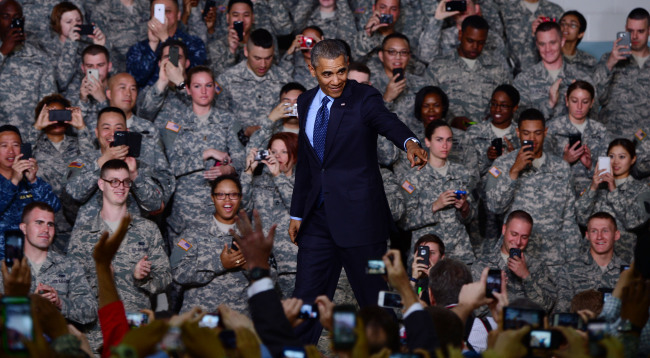U.S. President Barack Obama warned Saturday that Washington was prepared to use military force to defend its allies, while ratcheting up pressure on North Korea to renounce its nuclear ambitions.
During his visit to Yongsan Garrison, the U.S. military headquarters in central Seoul, he also underscored that the South Korea-U.S. alliance would not waver with “each bout of Pyongyang’s attention-seeking.”
His strongly worded speech came as the communist state has warned of a “new form” of nuclear test and made a set of saber-rattling moves including the firing of ballistic missiles last month.
“We will not hesitate to use our military might to defend our allies and our way of life,” he told a gathering of some 1,500 U.S. military personnel and family members at the garrison.
“Like all nations on earth, North Korea and its people have a choice. They can choose to continue down a lonely road of isolation, or they can join the rest of the world and seek a future of greater opportunity, greater security and greater respect.”
During his visit to Yongsan Garrison, the U.S. military headquarters in central Seoul, he also underscored that the South Korea-U.S. alliance would not waver with “each bout of Pyongyang’s attention-seeking.”
His strongly worded speech came as the communist state has warned of a “new form” of nuclear test and made a set of saber-rattling moves including the firing of ballistic missiles last month.
“We will not hesitate to use our military might to defend our allies and our way of life,” he told a gathering of some 1,500 U.S. military personnel and family members at the garrison.
“Like all nations on earth, North Korea and its people have a choice. They can choose to continue down a lonely road of isolation, or they can join the rest of the world and seek a future of greater opportunity, greater security and greater respect.”

Obama arrived here on Friday for a two-day visit. Korea was the second leg of his tour of four Asian nations including Japan, Malaysia and the Philippines.
Referring to the North as a “pariah state” that would rather starve its people than feed their hopes and dreams, Obama said that nuclear weapons would not make the North strong. He also stressed that Washington’s security partnership with Seoul would only grow stronger in the face of aggression.
“North Korea’s continued pursuit of nuclear weapons is a path that leads only to more isolation. It is not a sign of strength. Anybody can make threats, anyone can move an army and anyone can show off a missile,” he said.
“It does not give you security, or opportunity or respect. Those things don’t come through force. They have to be earned.”
Obama also expressed sadness over the tragic loss of hundreds of people in the recent ferry disaster, reaffirming the U.S.’ continued support for the rescue-and-search operations off the country’s southwestern coast.
“America will continue to support every rescue and recovery effort. It is the spirit that allows this alliance to endure. That’s what we are about. That’s been our commitment for more than 60 years, in good times and in bad.”
His meeting with U.S. service members came right after he and President Park Geun-hye visited the Combined Forces Command. It was the first time the two presidents of the allies had jointly visited the allied institution since the CFC was incepted in 1978.
Their visit to the CFC highlighted their resolve to sternly deal with additional provocations, particularly at the time when the North threatened to conduct a fourth nuclear test, which would significantly enhance its military nuclear capability.
“I believe that (our visit to the CFC) is very meaningful at the time when North Korea’s military threats are increasing,” Park was quoted as saying by her spokesperson Min Kyung-wook.
“I ask you to maintain strong deterrence with a robust allied defense posture so that North Korea dare not launch provocations.”
After a briefing on the security situations by CFC Commander Gen. Curtis Scaparrotti, Obama signed the guest book on the table where the Korean War Armistice was signed in July 1953. He called the table a symbol of the sacrifices of many people.
During the visit to the CFC, Park was accompanied by Defense Minister Kim Kwan-jin, Joint Chiefs of Staff Chairman Adm. Choi Yoon-hee, her chief of staff Kim Ki-chun and National Security Office chief Kim Jang-soo. Obama was with U.S. Ambassador to Seoul Sung Kim and National Security Adviser Susan Rice.
By Song Sang-ho (sshluck@heraldcorp.com)
-
Articles by Korea Herald




![[KH Explains] No more 'Michael' at Kakao Games](http://res.heraldm.com/phpwas/restmb_idxmake.php?idx=644&simg=/content/image/2024/04/28/20240428050183_0.jpg&u=20240428180321)














